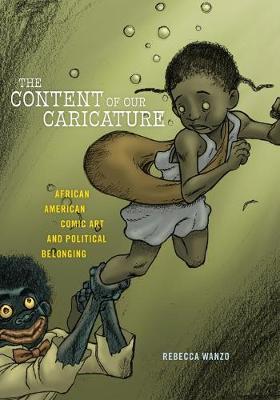The Content of Our Caricature: African American Comic Art and Political Belonging

The Content of Our Caricature: African American Comic Art and Political Belonging
Winner, 2021 Katherine Singer Kov cs Book Award, given by the Society for Cinema and Media Studies Traces the history of racial caricature and the ways that Black cartoonists have turned this visual grammar on its head Revealing the long aesthetic tradition of African American cartoonists who have made use of racist caricature as a black diasporic art practice, Rebecca Wanzo demonstrates how these artists have resisted histories of visual imperialism and their legacies. Moving beyond binaries of positive and negative representation, many black cartoonists have used caricatures to criticize constructions of ideal citizenship in the United States, as well as the alienation of African Americans from such imaginaries. The Content of Our Caricature urges readers to recognize how the wide circulation of comic and cartoon art contributes to a common language of both national belonging and exclusion in the United States. Historically, white artists have rendered white caricatures as virtuous representations of American identity, while their caricatures of African Americans are excluded from these kinds of idealized discourses. Employing a rich illustration program of color and black-and-white reproductions, Wanzo explores the works of artists such as Sam Milai, Larry Fuller, Richard "Grass" Green, Brumsic Brandon Jr., Jennifer Crut , Aaron McGruder, Kyle Baker, Ollie Harrington, and George Herriman, all of whom negotiate and navigate this troublesome history of caricature. The Content of Our Caricature arrives at a gateway to understanding how a visual grammar of citizenship, and hence American identity itself, has been constructed.
Traces the history of racial caricature and the ways that Black cartoonists have turned this visual grammar on its head Revealing the long aesthetic tradition of African American cartoonists who have made use of racist caricature as a black diasporic art practice, Rebecca Wanzo demonstrates how these artists have resisted histories of visual imperialism and their legacies. Moving beyond binaries of positive and negative representation, many black cartoonists have used caricatures to criticize constructions of ideal citizenship in the United States, as well as the alienation of African Americans from such imaginaries. The Content of Our Caricature urges readers to recognize how the wide circulation of comic and cartoon art contributes to a common language of both national belonging and exclusion in the United States. Historically
PRP: 314.13 Lei
Acesta este Prețul Recomandat de Producător. Prețul de vânzare al produsului este afișat mai jos.
282.72Lei
282.72Lei
314.13 LeiIndisponibil
Descrierea produsului
Winner, 2021 Katherine Singer Kov cs Book Award, given by the Society for Cinema and Media Studies Traces the history of racial caricature and the ways that Black cartoonists have turned this visual grammar on its head Revealing the long aesthetic tradition of African American cartoonists who have made use of racist caricature as a black diasporic art practice, Rebecca Wanzo demonstrates how these artists have resisted histories of visual imperialism and their legacies. Moving beyond binaries of positive and negative representation, many black cartoonists have used caricatures to criticize constructions of ideal citizenship in the United States, as well as the alienation of African Americans from such imaginaries. The Content of Our Caricature urges readers to recognize how the wide circulation of comic and cartoon art contributes to a common language of both national belonging and exclusion in the United States. Historically, white artists have rendered white caricatures as virtuous representations of American identity, while their caricatures of African Americans are excluded from these kinds of idealized discourses. Employing a rich illustration program of color and black-and-white reproductions, Wanzo explores the works of artists such as Sam Milai, Larry Fuller, Richard "Grass" Green, Brumsic Brandon Jr., Jennifer Crut , Aaron McGruder, Kyle Baker, Ollie Harrington, and George Herriman, all of whom negotiate and navigate this troublesome history of caricature. The Content of Our Caricature arrives at a gateway to understanding how a visual grammar of citizenship, and hence American identity itself, has been constructed.
Traces the history of racial caricature and the ways that Black cartoonists have turned this visual grammar on its head Revealing the long aesthetic tradition of African American cartoonists who have made use of racist caricature as a black diasporic art practice, Rebecca Wanzo demonstrates how these artists have resisted histories of visual imperialism and their legacies. Moving beyond binaries of positive and negative representation, many black cartoonists have used caricatures to criticize constructions of ideal citizenship in the United States, as well as the alienation of African Americans from such imaginaries. The Content of Our Caricature urges readers to recognize how the wide circulation of comic and cartoon art contributes to a common language of both national belonging and exclusion in the United States. Historically
Detaliile produsului











